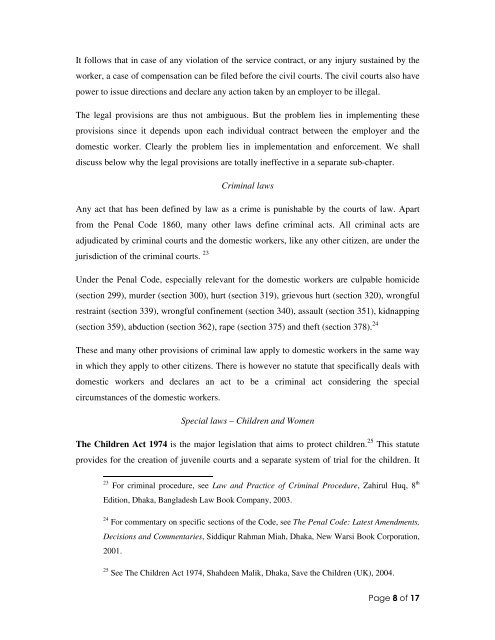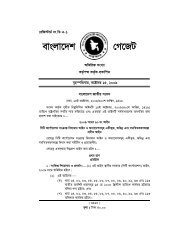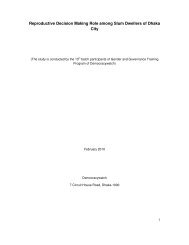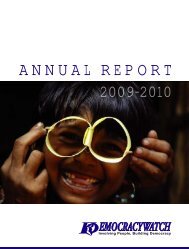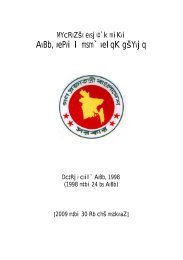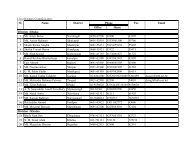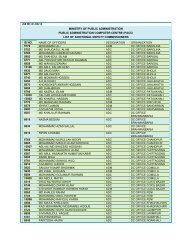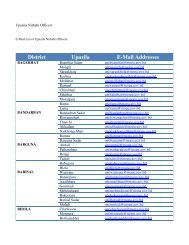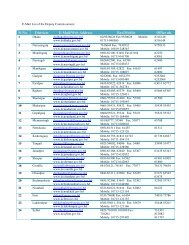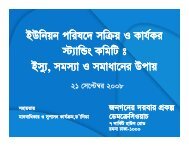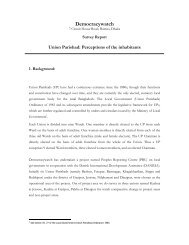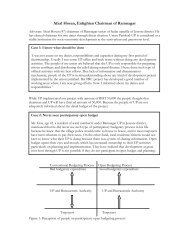Safeguarding the rights of domestic workers: Existing laws and ways ...
Safeguarding the rights of domestic workers: Existing laws and ways ...
Safeguarding the rights of domestic workers: Existing laws and ways ...
You also want an ePaper? Increase the reach of your titles
YUMPU automatically turns print PDFs into web optimized ePapers that Google loves.
It follows that in case <strong>of</strong> any violation <strong>of</strong> <strong>the</strong> service contract, or any injury sustained by <strong>the</strong><br />
worker, a case <strong>of</strong> compensation can be filed before <strong>the</strong> civil courts. The civil courts also have<br />
power to issue directions <strong>and</strong> declare any action taken by an employer to be illegal.<br />
The legal provisions are thus not ambiguous. But <strong>the</strong> problem lies in implementing <strong>the</strong>se<br />
provisions since it depends upon each individual contract between <strong>the</strong> employer <strong>and</strong> <strong>the</strong><br />
<strong>domestic</strong> worker. Clearly <strong>the</strong> problem lies in implementation <strong>and</strong> enforcement. We shall<br />
discuss below why <strong>the</strong> legal provisions are totally ineffective in a separate sub-chapter.<br />
Criminal <strong>laws</strong><br />
Any act that has been defined by law as a crime is punishable by <strong>the</strong> courts <strong>of</strong> law. Apart<br />
from <strong>the</strong> Penal Code 1860, many o<strong>the</strong>r <strong>laws</strong> define criminal acts. All criminal acts are<br />
adjudicated by criminal courts <strong>and</strong> <strong>the</strong> <strong>domestic</strong> <strong>workers</strong>, like any o<strong>the</strong>r citizen, are under <strong>the</strong><br />
jurisdiction <strong>of</strong> <strong>the</strong> criminal courts. 23<br />
Under <strong>the</strong> Penal Code, especially relevant for <strong>the</strong> <strong>domestic</strong> <strong>workers</strong> are culpable homicide<br />
(section 299), murder (section 300), hurt (section 319), grievous hurt (section 320), wrongful<br />
restraint (section 339), wrongful confinement (section 340), assault (section 351), kidnapping<br />
(section 359), abduction (section 362), rape (section 375) <strong>and</strong> <strong>the</strong>ft (section 378). 24<br />
These <strong>and</strong> many o<strong>the</strong>r provisions <strong>of</strong> criminal law apply to <strong>domestic</strong> <strong>workers</strong> in <strong>the</strong> same way<br />
in which <strong>the</strong>y apply to o<strong>the</strong>r citizens. There is however no statute that specifically deals with<br />
<strong>domestic</strong> <strong>workers</strong> <strong>and</strong> declares an act to be a criminal act considering <strong>the</strong> special<br />
circumstances <strong>of</strong> <strong>the</strong> <strong>domestic</strong> <strong>workers</strong>.<br />
Special <strong>laws</strong> – Children <strong>and</strong> Women<br />
The Children Act 1974 is <strong>the</strong> major legislation that aims to protect children. 25 This statute<br />
provides for <strong>the</strong> creation <strong>of</strong> juvenile courts <strong>and</strong> a separate system <strong>of</strong> trial for <strong>the</strong> children. It<br />
<br />
23 For criminal procedure, see Law <strong>and</strong> Practice <strong>of</strong> Criminal Procedure, Zahirul Huq, 8 th<br />
Edition, Dhaka, Bangladesh Law Book Company, 2003.<br />
24 For commentary on specific sections <strong>of</strong> <strong>the</strong> Code, see The Penal Code: Latest Amendments,<br />
Decisions <strong>and</strong> Commentaries, Siddiqur Rahman Miah, Dhaka, New Warsi Book Corporation,<br />
2001.<br />
25 See The Children Act 1974, Shahdeen Malik, Dhaka, Save <strong>the</strong> Children (UK), 2004.


